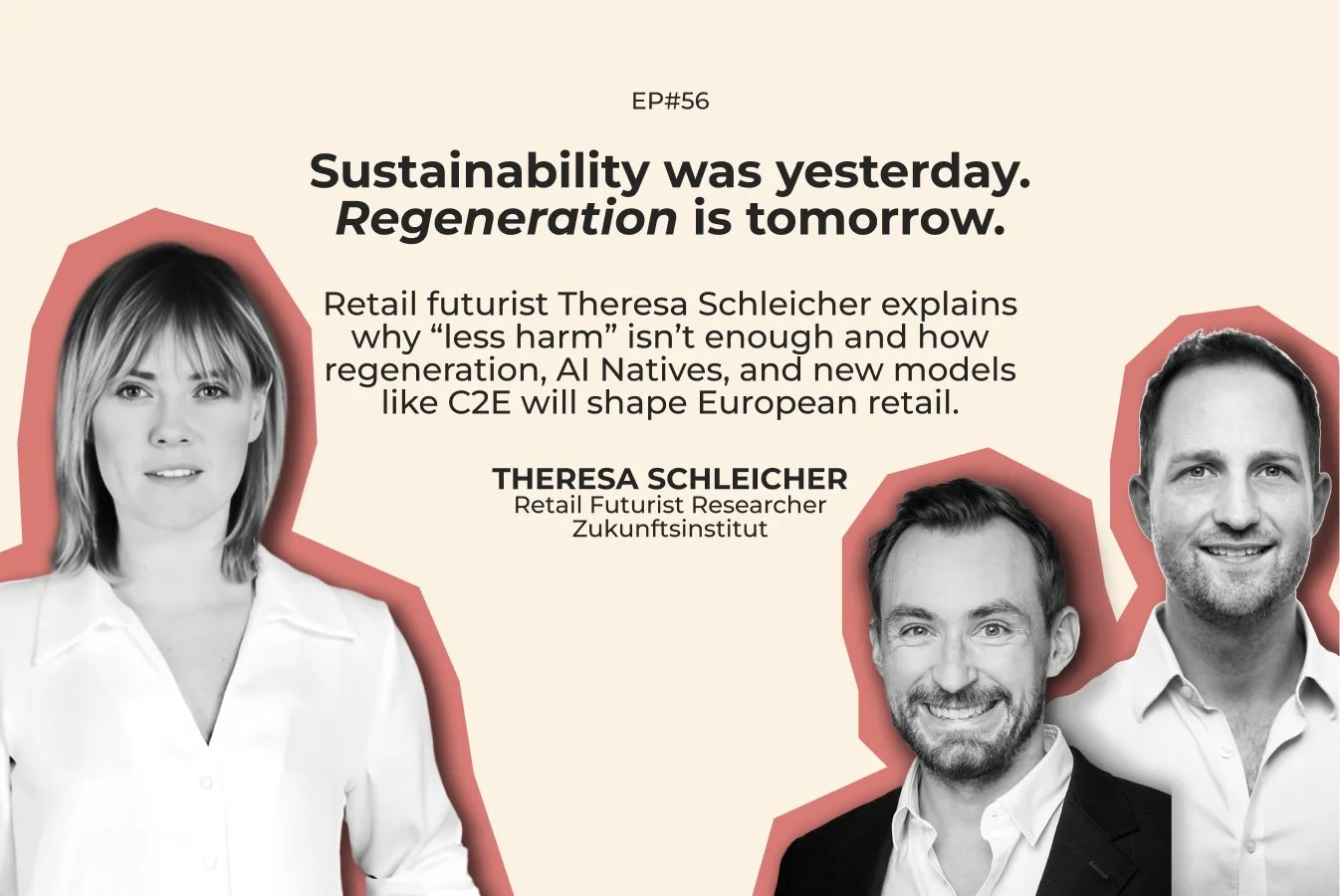#56 Theresa Schleicher (Zukunftsinstitut) on Regeneration, Consumer-to-Everything & AI Natives
Links: Google - Pocket Cast - Anchor - Spotify - Apple
The conversation around sustainability in retail has been going on for decades. But what if “sustainable” is no longer enough?
In Episode 56 of The Retail Reality Show, retail futurist Theresa Schleicher from the Zukunftsinstitut takes us beyond the well-worn language of sustainability and into the next frontier: regeneration.
Together with hosts Nino Bergfeld and Nicolas, she explores how retailers in Germany, Europe, and beyond can move from simply “doing less harm” to actively “creating more good.”
Regeneration: More Than Sustainability
For years, sustainability has been framed as sacrifice: less consumption, less pleasure, less fun. But consumers continue to click “buy now” on ultra-fast fashion platforms like Temu and Shein, driven by price, novelty, and what Theresa calls the “YOLO effect.”
This paradox shows why sustainability alone cannot scale.Regeneration changes the narrative. Instead of focusing on minimizing harm, regenerative commerce builds systems that actively restore and innovate. From regenerative agriculture in food retail to circular economy models in fashion, regeneration is about growth with purpose.
As Theresa points out, if “green” feels boring, it will never scale. Retailers must focus on making sustainable products desirable, bringing sustainability into the mainstream.
Consumer Contradictions: Values vs. Actions
One of the most striking parts of the discussion is the gap between consumer values and behavior. While shoppers claim to care about sustainability, their wallets often tell a different story.
Ultra-fast fashion thrives: Temu and Shein grow because they deliver novelty at record speed and unbeatable prices.
The YOLO effect: In times of crisis, consumers buy “cheap and cheerful” products, even when they (should) know better.
Perceived smartness: Many believe that buying directly from China is simply a clever way to cut out the middleman.
This tension between what people say they want and how they actually act defines the retail landscape in Germany and Europe today.
Global Megatrends Currently Shaping Retail
Theresa places regeneration alongside two other global megatrends:
Globalization in transition: A multipolar world order, new tariffs, and supply chain realignments. European retailers seek independence from overreliance on China by turning to Eastern Europe, Turkey, Vietnam, and India.
Technology and AI: the rise of AI Natives who trust ChatGPT more than brands, and the emergence of Customer-to-Everything (C2E) shopping models pioneered in China.
These megatrends define the strategic environment for European retailers, from Germany’s grocery leaders like Rewe to global e-commerce players.
AI Natives and Customer-to-Everything
A highlight of the episode is Schleicher’s analysis of AI Natives, a new generation of consumers who see AI as their primary advisor. Instead of asking a sales associate, they ask ChatGPT. Instead of browsing endless categories, they rely on LLM-driven shopping lists and personalized agents.
This shift risks reducing retailers to logistics providers. If AI does all the optimizing, where does inspiration come from? Schleicher argues that retailers must continue to surprise, delight, and inspire because inspiration is what AI cannot fully replicate.
In China, this trend has already evolved into Customer-to-Everything (C2E). Consumers scan a product and instantly see dozens of options: cheaper alternatives, secondhand offers, custom-made versions. For European retailers, the lesson is clear: product data must be optimized not only for search engines, but also for AI-driven platforms. LLM SEO is the new frontier.
Why Gamification Won’t Save Retail
While Chinese platforms use gamification (lotteries, spin-to-win, in-app challenges) to drive engagement, Schleicher is skeptical about its impact in Europe. Gamification fuels overconsumption, makes shopping feel like a trivial game, and clashes with cultural expectations in Germany and other European markets.
Retailers shouldn’t copy-paste these tactics. Instead, they should design experiences that create real value, such as nudging customers toward weekly grocery bundles to reduce delivery emissions, or using loyalty programs to reward sustainable choices.
From Resilience to Regeneration: A Call to Leaders
Perhaps Schleicher’s most powerful point is that resilience is outdated.
Resilience means survival. It means holding on through a crisis.
But it does not mean thriving.
Regeneration, on the other hand, is about building businesses that actively get stronger over time. For CEOs, this means:
Investing in circular and regenerative business models
Using AI not just for efficiency, but for inspiration and positive impact
Rethinking product portfolios and letting go of non-future-proof categories
Designing strategies where pleasure, price, and purpose align because only then can sustainability go mainstream.
Listen Now
This episode with Theresa Schleicher is a must-listen for anyone in retail strategy, innovation, or consumer insights. Whether you work in German grocery retail, European fashion, or global e-commerce, this conversation will help you prepare for what’s next.
🎧 Listen now on Spotify, Apple Podcasts, or wherever you get your podcasts.
